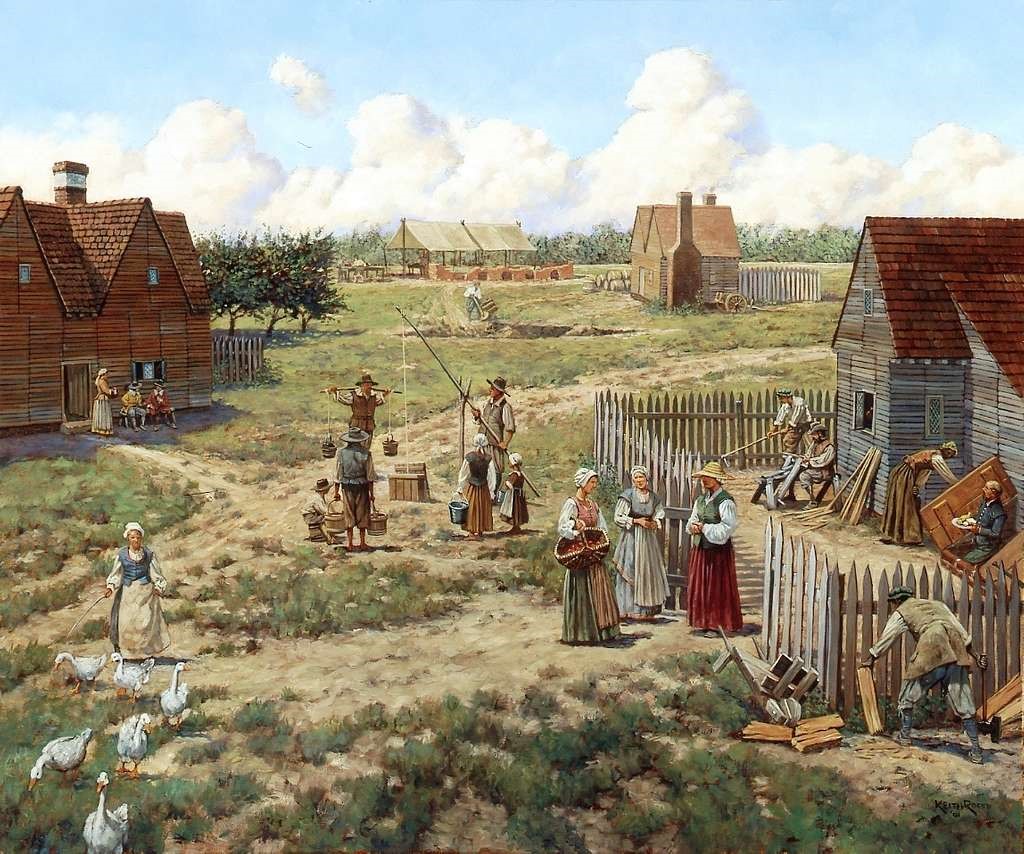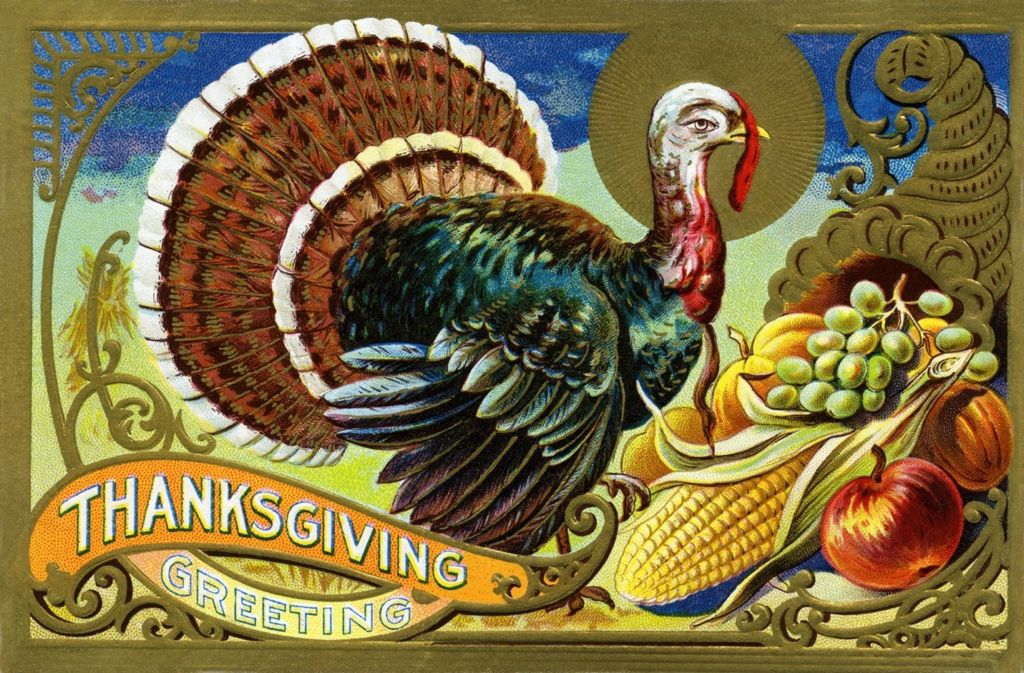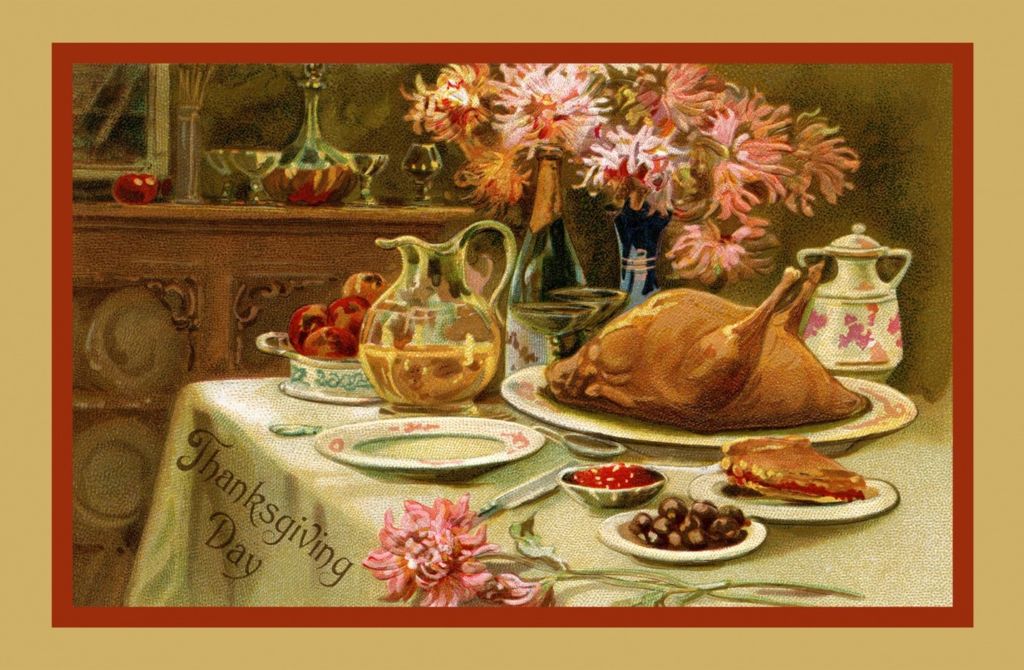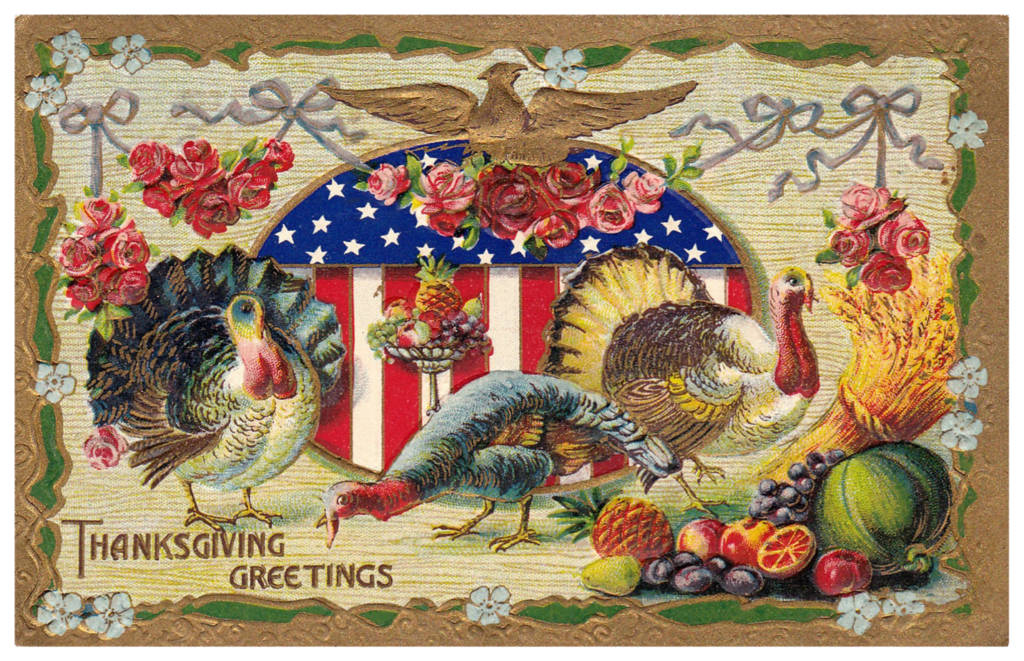An Old-Fashioned Thanksgiving
Posted By William de Vere On In North American New Right | Comments DisabledWhen I was a child, Thanksgiving was little more than midway point between Halloween and Christmas, lacking the magic of either. I didn’t much like the food (except pumpkin pie), I hated football (and still do), and I found my great-grandfather’s extreme old age somewhat disquieting. However, as I’ve gotten older, I’ve come to appreciate this late autumn feast, to the point that it is now one of my favorite days of the year.
In retrospect, I fondly recall making the drive to my grandparents’ country home on a cold and rainy day — that is how I always remember it — where my extended family had assembled and the scent of roasting turkey and sweet potatoes pervaded the house. After the meal, while the adults talked and watched football and drowsed, the children would go outside and play beneath the gray skies, the smell of woodsmoke and damp fallen leaves in the air. I knew I had attained a certain level of maturity when I found myself wanting to stay and listen to the grown-ups talk rather than hurrying through dinner to play with my cousins. All of these memories come back to me this time of year, tinted in the earth-tones of late fall, and now I even think back fondly on the interminable football games and my great-grandfather’s grave presence. These days I enjoy partaking in the rituals of Thanksgiving with my own family, though with the passing of all my grandparents and the dispersal of my parents, siblings, cousins, aunts, and uncles throughout the country, it will never feel quite the same.
Despite this newfound appreciation, I still cannot help but feel some ambivalence about the holiday. First, as it is currently practiced, there is a lot of decadence associated with Thanksgiving: gluttony on an epic scale; gathering around the television to watch overpaid athletes toss a ball around (and all the advertising that goes along with it); the Macy’s parade, which is essentially a three-hour-long commercial featuring mediocre and degenerate pop music stars and idiotic daytime TV hosts; and the aptly named Black Friday, a ghastly consumerist extravaganza that now begins the evening of Thanksgiving, depriving retail workers of even one day of respite. While some of these traditions might have been wholesome at one point in time, they are now particularly egregious examples of late-imperial excess.
There is also the politically charged nature of the holiday. On the one hand it is celebrated by civic nationalists as a kind of multicultural lovefest between Indians and Pilgrims, an expression of American unity, and a day to give thanks for our diversity [2], sacred freedoms [3], and democracy [4]. On the other hand, the holiday is vilified [5] as a celebration of colonialism and genocide. There is a little truth to both sides; while the “original” Pilgrim Thanksgiving of 1621 was marked by concord between the settlers and the Wampanoag, this peace was highly tenuous [5] and followed by years of bloody war that, according to some estimates [6], killed 30% of settlers and half of the Native population of New England. The story of the 1621 Thanksgiving is therefore a mostly factual tale of cultural cooperation, albeit one that was doomed to failure. Whatever the case, for a dissident, Man of the Right, and integral traditionalist, there is little to celebrate in these events, at least as they are presently interpreted.
Moreover, as a Southerner, I resent that the Pilgrims get all the credit for this holiday, while in reality the first Anglo Thanksgiving on North American soil occurred two years before at Berkeley Plantation [7] in Virginia (or even earlier [8]) — though it was not, admittedly, a feast on par with the 1621 Thanksgiving. Indeed, for a long time Southerners considered the “official” national Thanksgiving holiday to fall on the fourth Thursday of November — proclaimed by the tyrant Lincoln at the behest of a Yankee ladies’ magazine editor [9], centered around the Pilgrims and New England staples such as pumpkin, cranberries, and turkey, and most strongly advocated for by evangelical abolitionists [10] — to be yet another form of Northern cultural imperialism [11], in keeping with the Yankee’s penchant for telling other people how to live.
Of course, over time this opposition softened, and now Thanksgiving is celebrated throughout the country, despite its unmistakable New England provenance. Ultimately, when one takes away the ideological underpinnings and decadent contemporary practices, Thanksgiving is America’s only true harvest festival [13]. Aside from a few neopagans and traditional Catholics, we have abandoned the pre-modern and early modern harvest festivals that were so important to our ancestors — Lammas [14], Michaelmas [15], and Martinmas [16], to name only a few — and replaced them with this single nationwide celebration of nature’s bounty. Of course, it is somewhat atavistic, as very few Americans nowadays are dependent upon the local harvest and can easily obtain cranberries, turkey, sweet potatoes, and canned pumpkin any day of the year. But it still ties us to the agrarian traditions of our forebears and the seasonal cycles that historically defined human life, and for that reason alone is a wholesome affair.
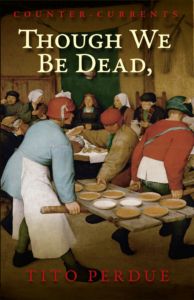 [17]
[17]You can buy Tito Perdue’s Though We Be Dead Yet Our Day Will Come here [18].
Thanksgiving is not simply a harvest festival, however. Days of thanksgiving were proclaimed frequently in American history, and did not necessarily have a feast associated with them, though they were often intended as a day of prayer and gratitude to God for His bounty. Indeed, rites of thanksgiving are found in religions the world over: as Father Francis Weiser [19] notes, “The religious function of giving thanks to Divinity for favors received is as old as humanity.” In celebrating the Thanksgiving holiday, we are not simply perpetuating a New England observance of relatively recent origin, but a tradition linking us to our most distant ancestors.
Thus, when I speak of an “old-fashioned Thanksgiving,” I am not necessarily referring to the holiday as depicted by Norman Rockwell [20], nor the Yankee abolitionist festival proclaimed by Abraham Lincoln, nor even the “first” Thanksgivings at Plymouth and Jamestown. I refer to a day set aside for expressing gratitude — to God, nature, and/or our forebears — for the blessings we have received, which includes not only the food on our tables but our families, our people, and the traditions handed down by our ancestors. In an era that lends itself to cynicism, negativity, and despair, such festivals are necessary to remind us of what we are fighting for.
Seen from this perspective, stripped of its ideological baggage, our American Thanksgiving is simply one manifestation of harvest and thanksgiving festivals occurring throughout history the world over. For this reason, I believe that it is still a holiday that can be celebrated by dissidents with some connection to heritage America, despite its unsavory contemporary associations.
A few modifications are necessary. For starters, I would suggest that the perfect symbol for this holiday is the cornucopia, not the now-ubiquitous turkey. The association of turkey with Thanksgiving was originally a New England thing with limited applicability elsewhere in the United States (moreover, the holiday’s contemporary nickname, “Turkey Day,” is just god-awful, and I wish ill on anyone who uses it). The cornucopia, by contrast, is a symbol of the harvest and the beneficence of God and nature, and can be customized to contain whatever the local fruits of the harvest might be. It binds heritage Americans throughout the country while acknowledging the different regional and ethnic European-derived cultures that comprise the United States. Given its Greco-Roman origins, the symbolism of the cornucopia, the “horn of plenty,” also links European-Americans to their classical past.
The Thanksgiving feast should be particular to one’s culture, region, and family history. Though the New England turkey, pumpkin, and cranberries have become inescapable features of the meal, other dishes can be added that are more reflective of the local culture. In the South, for instance, many families add pecan pie, sweet potato pie, and cornbread to the traditional spread.
Additionally, in reflecting upon the things we are grateful for, we should be sure to include our ancestors. November, after all, has long been considered a month to remember the dead [23], beginning with All Hallows and All Souls Day [24]; it is a time to think on those who have come before us in our family line. In addition to our direct ancestors, we should also think on our culture’s heroic figures. To this end, a reflection [25] by Charles Maurras is pertinent. Though written for All Souls Day, it is equally applicable to all festivals of remembrance:
There is the universal cult of the dead, of all the dead, of those who had existed, provided that they had belonged to the human race; and there is, closely related, the particular cult, more reserved, prouder, and, in my sense, more beneficial. That renders to the elite among the dead, those whom the positivists call, a little verbosely, “the great types of humanity,” and the Catholics, more tersely, the “saints” . . . By obliging us to hold the dead as our models, it forces us to select from among these scattered people, hence, indirectly, to make a critique of our own characters: by applying our minds to consider those great dead men, it opens us up to the way of personal exaltation and perfection.
 [26]
[26]You can buy Greg Johnson’s Truth, Justice, & a Nice White Country here [27]
Reverence for ancestors will naturally differ depending on your ethnic and regional background. This means that Pilgrim-worship is not mandatory everywhere — if you are a New Englander, by all means honor their memories; if you happen to be a fan of the Union and Abe Lincoln, feel free to venerate them, too (though we wouldn’t get along). As for me and my house, we will honor the Jamestown settlers from which we are descended, the planters and pioneers of the South, and before that the English and Irish and Norman peoples of old Europe.
Finally, along with a celebration of the harvest and gratitude for all we hold dear, the most important component of Thanksgiving is family. Even in an age where families are dispersed across the continent, millions of people make the effort to return home to spend just a few days with their kin. This can lead to conflict, of course, and numerous articles [28] can be found on “how to deal with your MAGA uncle at Thanksgiving” and the like. Political differences have become deeply personal, and opposing sides no longer even share fundamental premises. For dissidents, it may be difficult to feel that you belong to the same reality as your Left-wing aunt or antifa cousin, let alone the same family. However, if there is one time of the year when this might be overcome, it is the Thanksgiving feast. Regrettably, this grows more difficult as polarization increases, and in some cases it may simply not be worth the trouble to attempt to connect with your relatives who might very well hate you and dox you if they knew your real views. But hopefully this is not typical.
Of course, for many Americans Thanksgiving is just an excuse to eat and drink in the company of family and friends, and there is nothing wrong with that. For those of us who require theoretical justification, it is possible to acknowledge the decadence, lies, and vapid ideology behind the contemporary Thanksgiving feast while still observing the holiday as a celebration of nature’s bounty, of gratitude for all that is good in the world, and of reunion with family and friends. In many of the songs and stories [30] of Thanksgiving composed over the years, these appear to be the most salient themes — not the dour Pilgrims, not the overstuffed turkey, not football, and definitely not the consumerist nightmare of Black Friday. As the only holiday unique to the American ethny [31], Thanksgiving deserves to be rescued from those who would reinterpret or vilify it for their own ends. As with most other traditional festivals these days, celebrating it in the old-fashioned way is now an act of defiance.
* * *
Counter-Currents has extended special privileges to those who donate $120 or more per year.
- First, donor comments will appear immediately instead of waiting in a moderation queue. (People who abuse this privilege will lose it.)
- Second, donors will have immediate access to all Counter-Currents posts. Non-donors will find that one post a day, five posts a week will be behind a “Paywall” and will be available to the general public after 30 days.
- Third, Paywall members have the ability to edit their comments.
- Fourth, Paywall members can “commission” a yearly article from Counter-Currents. Just send a question that you’d like to have discussed to [email protected] [32]. (Obviously, the topics must be suitable to Counter-Currents and its broader project, as well as the interests and expertise of our writers.)
- Fifth, Paywall members will have access to the Counter-Currents Telegram group.
To get full access to all content behind the paywall, sign up here:
Paywall Gift Subscriptions
 [33]If you are already behind the paywall and want to share the benefits, Counter-Currents also offers paywall gift subscriptions. We need just five things from you:
[33]If you are already behind the paywall and want to share the benefits, Counter-Currents also offers paywall gift subscriptions. We need just five things from you:
- your payment
- the recipient’s name
- the recipient’s email address
- your name
- your email address
To register, just fill out this form and we will walk you through the payment and registration process. There are a number of different payment options.

